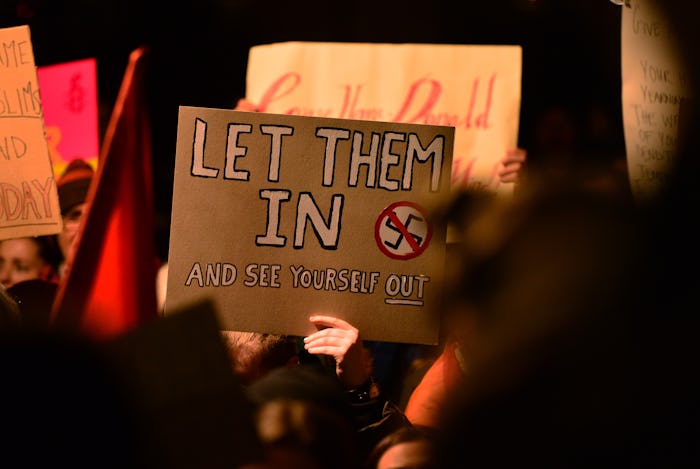News

How Iraqis Are Affected By The Revised Travel Ban
After the disastrous reception of his first attempt at a travel ban, President Donald Trump signed a revised executive order on Monday aimed at temporarily stopping immigration from multiple Muslim-majority countries. The new version has some big changes on its surface, but many of the same flaws at its core. That tension can most fully be seen in how Iraqis are affected by the revised travel ban.
In a statement to Romper, a State Department spokesperson clarified the new DHS policy, quoting the department and saying, "The Refugee Admissions Program will be temporarily suspended for the next 120 days while DHS and interagency partners review screening procedures to ensure refugees admitted in the future do not pose a security risk to the United States. Upon resumption of the Refugee Admissions Program, refugee admissions to the United States will not exceed 50,000 for fiscal year 2017. The Executive Order does not apply to those refugees who have already been formally scheduled for transit by the State Department. During this 120-day period, similar to the waiver authority for visas, the Secretary of State and Secretary of Homeland Security may jointly determine to admit individuals to the United States as refugees on a case-by-case basis, in their discretion, but only so long as they determine that the entry of such individuals as refugees is in the national interest and would not pose a threat to the security or welfare of the United States."
In the original order, Iraq was one of the seven countries from which immigration was temporarily halted. That decision generated a lot of backlash, with many pointing out that Iraqi interpreters and soldiers fighting terrorism alongside United States military forces were being denied protection from the country they'd risked their lives to help. Others worried that the ban's seeming demonization of Iraqis would destabilize that country's government, which is allied with the United States. So, reportedly after talks with security officials in Baghdad, the architects of the new order removed Iraq from the list of banned countries. In exchange, Iraq will share more information about nationals who might be dangerous, and cooperate with the United States on increased vetting of Iraqis applying for United States visas.
So, all of that sounds like a big improvement when it comes to the way that Iraqis will be treated under the ban. But some experts are warning that it's not actually as different as it seems.
In a conference call with reporters organized by Amnesty International, Naureen Shah, the director of Amnesty International USA's Security with Human Rights Program, pointed out that the revised travel ban halts the United States refugee program for 120 days, and then caps the number of refugees allowed into the country in 2017 at 50,000, much lower than previous numbers.
The Special Immigrant Visa program protects some of the Iraqi translators and allies, but that program is no longer accepting new applications. So, as the Human Rights First blog says,
The Special Immigrant Visa program, while vital, is not the primary method of protecting our vulnerable Iraqi allies. The majority of these individuals enter through the U.S. Refugee Admissions Program. Under the bipartisan Refugee Crisis in Iraq Act, Iraqis that served with the U.S. government, media, or non-governmental organizations were given a direct access pipeline to enter the refugee admissions program. This population includes interpreters and translators that served with combat troops but missed the cutoff to apply for a special immigrant visa.
State Department spokespersons did not immediately respond to a request for comment.
In short, many Iraqis will still be affected by the blanket refugee ban, even though their country will no longer be on the official list.
The treatment of Iraq is only one example of how the ban may outwardly seem more fair, but is actually remarkably similar to its previous incarnation. If you protested the last time but were thinking of sitting this one out, you might want to think again.